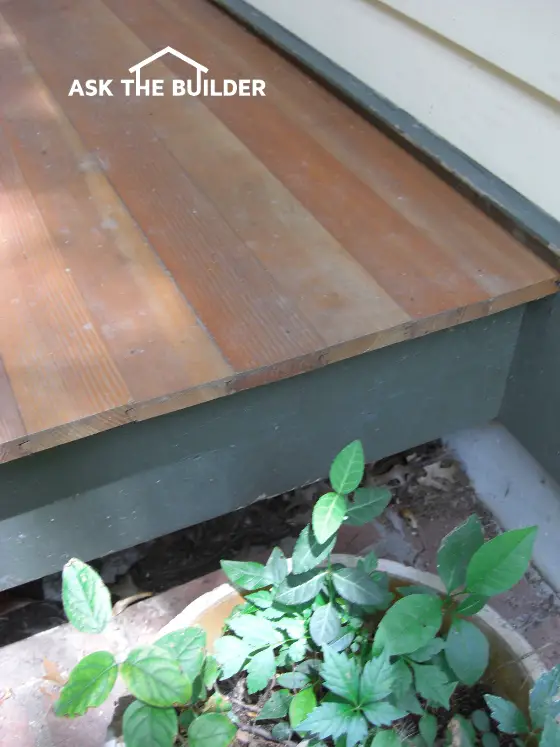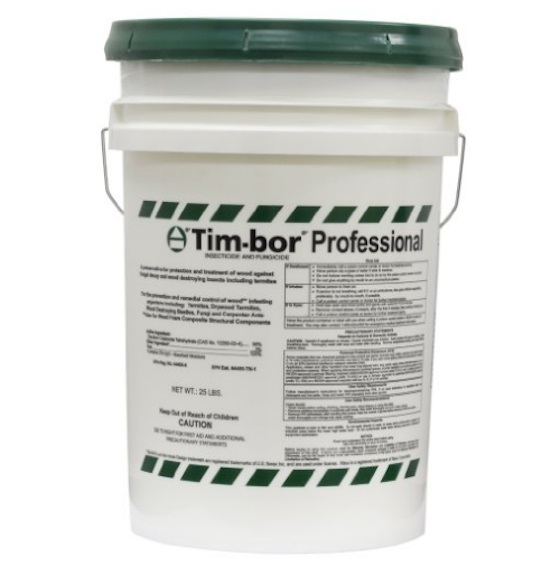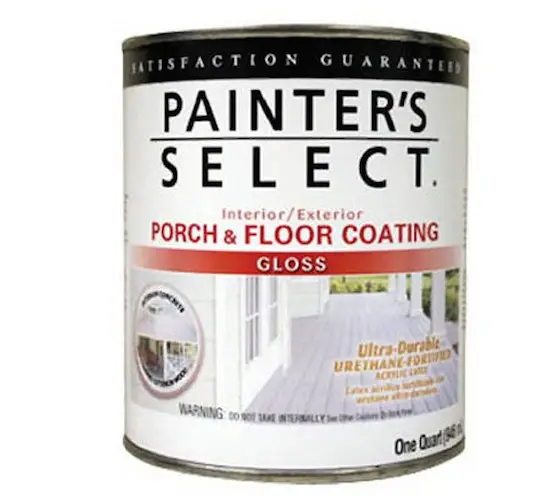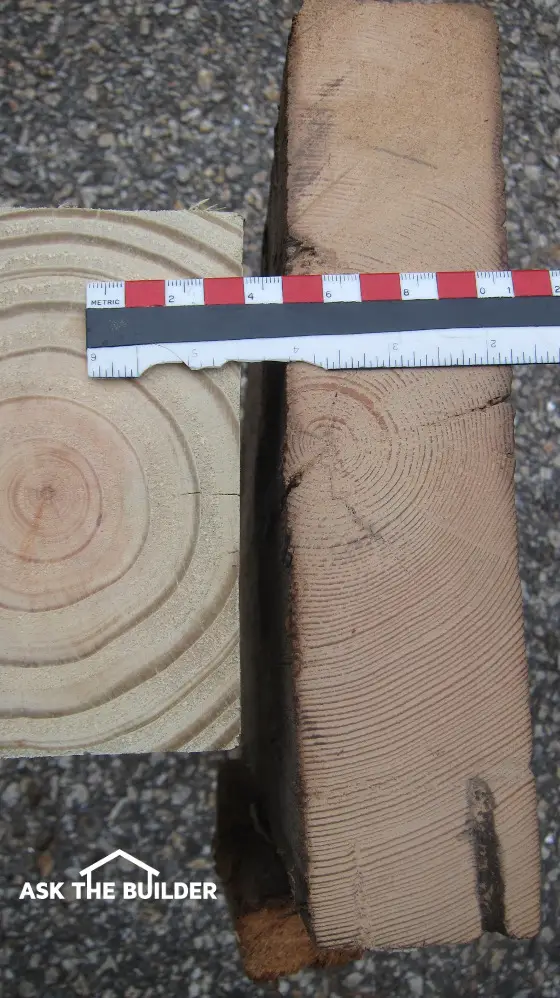Porch Decking

Porch Decking | This is real Douglas Fir porch decking. It’s tongue and groove allowing the nails to be hidden. Copyright 2017 Tim Carter
Porch Decking TIPS
- Traditional wood porches had special wood
- Wood was installed at a slant and shed water
- Use borate chemicals to pre-treat wood before installation
- Stain all wood on all sides and edges BEFORE installation
- CLICK HERE to Get Tim's FREE & FUNNY Newsletter!
DEAR TIM: I’m restoring an older home that has a patio porch deck. It’s covered, so perhaps it’s just a deck porch.
The wood was painted, but is in bad shape due to neglect. What material would you install if you wanted to maintain the character of the house? I’ve seen composite porch decking, but I’m worried that I could have problems with it and that it just won’t look real.
Are there any great trade secrets you can share about decks and porches? Sara G., Mt. Orab, OH
DEAR SARA: I’m really familiar with porch decks, especially ones made from wood.
All My Houses Had Wood Porch Decks
Every house I’ve owned has had one, and some of the wood is over 100-years old and still in very good condition. There are several reasons why the wood has lasted that long, not the least of which is diligent care on the part of the homeowner.
Classic Look
Wood porch decking is absolutely a classic look. You’ll find it on many a covered porch in older homes out in the country as well as houses in the city. I know for a fact that there are thousands of houses in Cincinnati, OH, which is near you, that have original wood porch decks that are still in use. They may be painted, but it’s still wood.
Wood Porch Installation Tricks
If you study your porch, assuming it was installed correctly when your home was built, you’ll discover that it probably is not level front to back and that the wood strips are installed opposite of the way you might think they should be.
Carpenters well over 100 years ago discovered that even though porches like yours were covered, wind-driven rain would saturate the wood in fierce storms. The quicker that water got off the wood, the better. Installing the wood so that it has a fall of 1/8 inch per foot allowed for excellent drainage.
Free & Fast Bids
Tongue & Grooves = Drainage Channels
To ensure no water got trapped between the individual pieces of wood decking, the carpenters ran each individual strip of wood perpendicular to the front wall of the house. That way the seams between the pieces of wood acted as natural conduits for the water to drain to the end of the porch at the overhang.
Installing the wood parallel with the front wall of the house creates a dam between pieces of wood that traps the water.
Douglas Fir - Premium Porch Lumber
The wood that I prefer to use for these porch decks is vertical grain Douglas Fir. It can still be found at many traditional lumberyards. The wood that was installed on many of the old porches, and the ones I built, had a tongue and groove profile.
This unique profile is the same used when milling oak for interior hardwood floors. It allows for blind nailing of the strips of wood and adds significantly to the strength of the wood as each strip interlocks with the one on either side of it.
This minimizes or eliminates sag or bounce when you walk on the wood in between the floor joists that support the porch decking. It’s time-tested technology that works.
Generation One Composite #FAIL
 I tested a composite porch decking that was made to mimic the wood material. It failed miserably.
I tested a composite porch decking that was made to mimic the wood material. It failed miserably.
Composite decking products contain high amounts of plastic. Plastic expands and contracts dramatically when heated. If you don't allow for the decking to move, it can bow, twist or uplift as the material grows in length.
The instructions said to make sure the decking was covered from the sun. That’s pretty impossible to do as the sun can often hit the edges of the decking early and late in the day and as the seasons change with the sun lower in the sky.
In my case, even though the decking was installed per the manufacturer’s specifications, it developed huge humps from the heat expansion of the plastic in the composite product.
Treat With Borate
If you want your new wood material to last for generations, you have to treat it with borate chemicals before it’s installed. Borate powder is easy to get and it dissolves in hot or warm water with ease.

Here's a great borate powder for treating wood. There are many borate suppliers to choose from. CLICK THE PHOTO NOW TO HAVE SOME DELIVERED TO YOUR HOME IN DAYS.
Cut the pieces to the exact length you want and then soak each piece of wood in hot water that contains borate powder.
Let each piece soak under water in a trough for about two minutes. Stack the wood in a shaded area making sure to put wood spacers that resemble paint stirring sticks between layers so the wood can dry.
Wait Two Weeks
Once it’s dried for two weeks, then paint the wood on all edges and surfaces before it’s installed. You can use semi-transparent wood preservatives instead of paint if you want the natural look.
What is the Best Porch Paint?
In case you want to paint the porch, I recommend paints that are specially formulated for outdoor porches. They say so on the label.

Here's a great urethane-fortified paint. It comes in three different sheens. NOTE on the label it says it's for porches and floors! It's tough enough to walk on. CLICK THE IMAGE NOW TO have this paint delivered to your home.
Be sure to paint all the wood on all sides and edges, including the tongue and groove before you install the wood. Always paint any cut ends to stop water infiltration into the end grain.
What Primer Should I Use on the Wood?
Read the label of the finish paint you intend to use. They almost always tell you the best primer that's compatible with the finish paint. It's best to apply the finish paint as soon as the primer label says it's safe to recoat. You'll get a better bond between the two paints if you do it this way.
Stain All Sides And Edges
The key is to coat all the surfaces of the decking so that water will have a very difficult time entering the wood. If you don’t pretreat the wood before it’s installed, you’ll never be able to coat all the surfaces.
Hot-Dipped Galvanized Nails
Use double-dipped hot galvanized finish nails to install the wood. These will last for generations, especially if the wood is covered with a roof.
IMPORTANT TIP: If you have to cut a piece of wood that’s been treated or painted, be sure to coat the cut end with the borate solution and then the finish sealant or paint.
If you want to minimize any cupping or warping in the wood, consider installing a vapor barrier on the soil under the porch. This will slow water vapor from pouring into the underside of the wood, even though you’ve treated it.
The wood used on many of the old houses had another huge advantage over wood available today. It came from ancient trees whose growth rings were very small.

New lumber is nothing like the lumber of old. Look at how wide the lighter-colored spring wood bands are in the timber to the left! (C) Copyright 2017 Tim Carter
As such there was often as much dense summer wood in the lumber as there was the lighter spring wood. Lumber today seems to have a much higher percentage of light spring wood than the dense dark summer wood. Spring wood, because of its open cellular structure, is much more susceptible to rot than the dense summer wood.
This is why it's so very important to treat modern lumber with the borate chemicals. They readily soak into the light-colored spring wood.
Column 839
20 Responses to Porch Decking